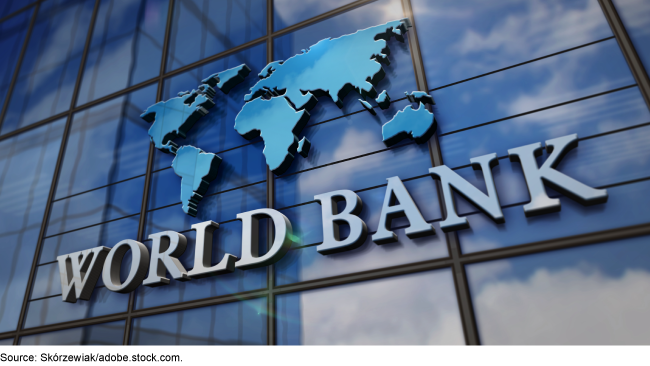World Bank Procurement: Risk Monitoring Can be Enhanced as U.S. Businesses Face Challenges Competing
Fast Facts
The World Bank lends money to low-and middle-income countries for infrastructure, social, and economic development. It assesses risks and oversees borrowers who award contracts and manage the projects.
U.S. businesses can compete for contracts, but nearly half of the 15 we spoke to raised concerns about process integrity and transparency. Over half said they may not bid on future contracts based on their prior experiences. Also, Treasury, which reviews Bank projects on behalf of the U.S., doesn't have a formal process to monitor projects with national security concerns.
We recommended better monitoring of World Bank projects, and more.

Highlights
What GAO Found
The World Bank's guidance on assessing project procurement risk aligns with leading international practices for assessing the capacity of public procurement systems. For example, prior to submitting projects to its Board of Directors, the World Bank assesses the capacity of borrowers to implement procurement. While the World Bank has processes to manage project procurement risk, internal reviews have recommended improvements related to reporting integrity concerns and implementing new procurement processes.
World Bank Borrowers use Bank Financing for Projects Ranging from Building Transportation Infrastructure (Left) to Supporting Vaccination Programs (Right)

GAO selected and interviewed a nongeneralizable sample of 15 U.S. businesses on challenges they reported facing when competing for contracts awarded by World Bank borrowers. Ten of the 15 businesses reported that borrowers often preferred to evaluate proposals based only on the lowest cost, as opposed to considering both quality and cost. More than half of the 15 businesses also raised concerns about the World Bank's oversight over the procurement and implementation of projects in which they were involved. Four of these businesses said that World Bank officials were reluctant to be involved even when issues with borrowers arose. Around half of the 15 businesses also raised concerns about procurement transparency and integrity. More than half of the 15 businesses said that they may not bid on future contracts based on their previous experiences. U.S. agencies like the Department of Commerce (Commerce) offer assistance to businesses competing for borrower contracts. This includes providing information on procurement opportunities and training sessions about doing business with the World Bank.
The Department of the Treasury (Treasury) determines whether the U.S. should support proposed World Bank borrower projects based on factors such as U.S. national security and foreign policy interests and legislative requirements. Treasury officials told GAO they informally monitor some projects during implementation when issues are brought to their attention. However, Treasury does not have formal processes for determining whether and how to monitor World Bank borrower projects. Without such processes, Treasury may not be able to proactively monitor projects and address potential risks to U.S. interests.
Why GAO Did This Study
The United States is one of the largest contributors to the World Bank, which provides financing to low- and middle-income countries for development projects. Borrower countries are responsible for managing project procurement. The World Bank is responsible for assessing and monitoring their capacity to do so. Federal law requires Commerce to take actions to assist U.S. businesses competing for borrower contracts. Treasury reviews proposed World Bank borrower projects and determines the U.S. voting position with input from other agencies.
GAO was asked to review issues related to World Bank borrowers' procurement. This report examines, among other objectives, (1) the extent to which the World Bank's guidance is designed to ensure that borrowers have the capacity to manage procurement; (2) challenges selected U.S. businesses reported facing when competing for borrower contracts, and how U.S. agencies assist businesses in pursuing these contracts; and (3) the extent to which Treasury reviews and monitors World Bank borrower projects for risks to U.S. interests.
GAO reviewed World Bank and Treasury documents, interviewed a nongeneralizable sample of 15 U.S. businesses that pursued borrower contracts, and interviewed World Bank, Treasury, and Commerce officials.
Recommendations
GAO is making two recommendations to Treasury to develop processes for whether and how to monitor World Bank borrower projects. Treasury agreed with both recommendations.
Recommendations for Executive Action
| Agency Affected | Recommendation | Status |
|---|---|---|
| Department of the Treasury | The Secretary of the Treasury should ensure that the Office of International Affairs develops guidance and a formal process to determine whether to monitor individual World Bank borrower projects based on risks to U.S. interests. (Recommendation 1) |
When we confirm what actions the agency has taken in response to this recommendation, we will provide updated information.
|
| Department of the Treasury | The Secretary of the Treasury should ensure that the Office of International Affairs develops guidance and a formal process for how it will monitor World Bank borrower projects when it determines that monitoring is necessary. (Recommendation 2) |
When we confirm what actions the agency has taken in response to this recommendation, we will provide updated information.
|
